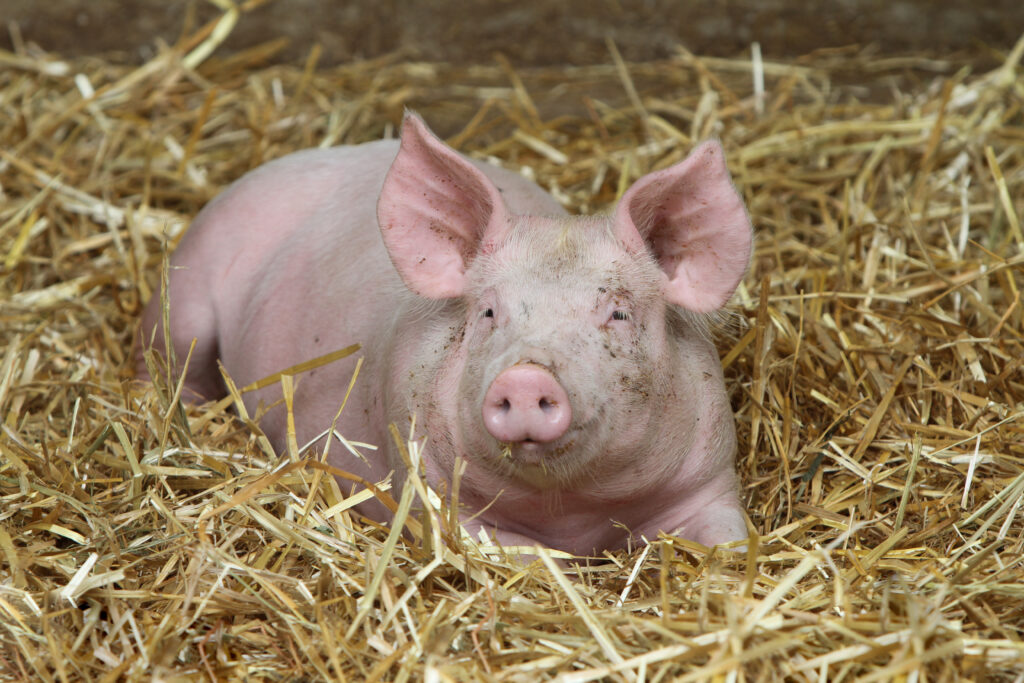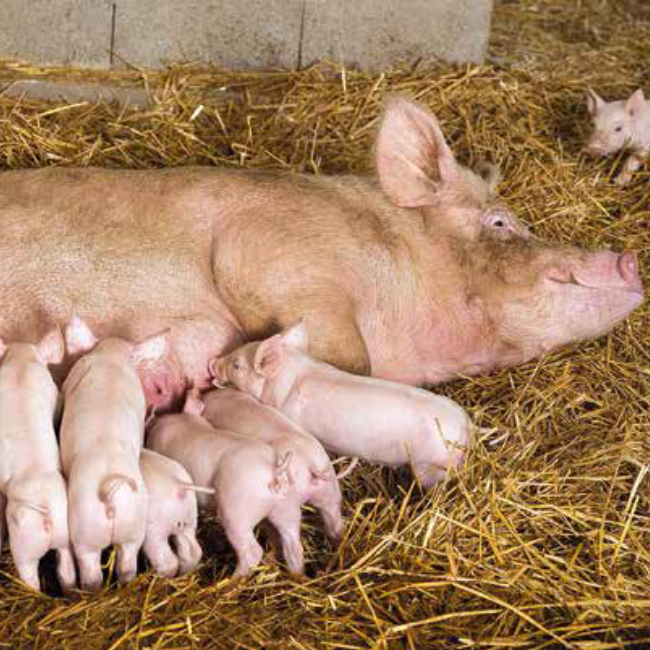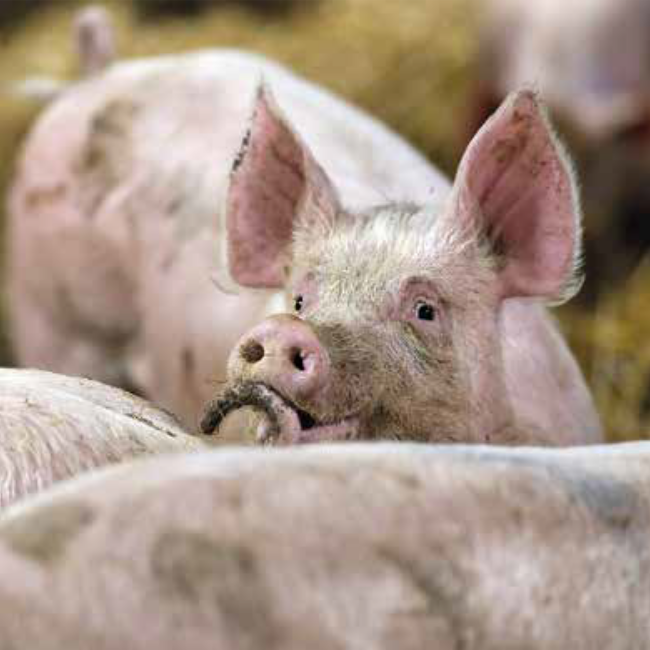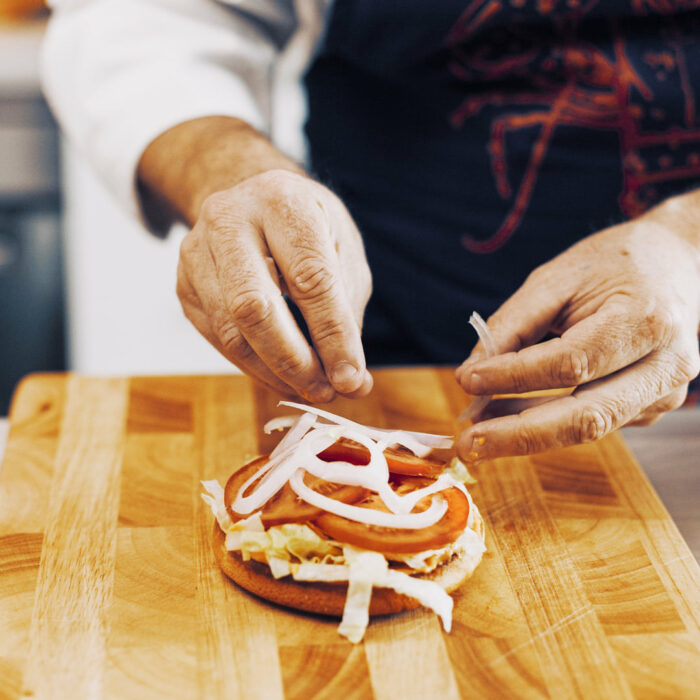In recent years, the group Jean Hénaff has become aware that its responsibility goes beyond its legal commitment. In the past, the french company focused, with a strong will to do things right, on topics related to its direct perimeter,
on its pig slaughter house in Pouldreuzic and on the quality of the meat. Jean hénaff had regular interactions with the OABA (farm animals protection association) and, of course, with the IFIP (Institute for pig chain).
Ensuring pigs welfare throughout their lives
Enrichment of the living environment
Pigs are very curious, sociable, fossorial and adventurer animals. As part of the pig Communauté de Progrès, the improvement and the testing of the pig environment have been clearly determined because when the pig chews an object, it mustn’t alter its digestive system nor cause an injury. Gestating sows spend most of their time lying on the floor. Having soft and shock-absorber beddings, thanks to quality straw, improve the pig living environment.
While studying the gestating sows, scientists noticedthat stress-related behaviours such as vacuum-chewing,repeated licking and air sucking are three or four timesless frequent when the environment is provided with abedding. This enrichment reduces aggressive situationsbetween conspecifics. Animals that are busy discovering their environment are less aggressive towards each other. There are fewer wounds and less “caudophagia” (tail-biting by a conspecific).
Other materials can be offered to the pigs to maintain or renew their interest and stimulate them (rope, peat, wood/ranching, root vegetables, etc.).
Alternatives to painful conditions (stopping the castration of piglets, teeth grinding, etc.)
In 2020, progress have been made regarding teeth grinding. In addition to the organic breeders, two conventional breeders working for Jean Hénaff have raised piglets without grinding their teeth.
Why is it crucial stopping these practices such as stopping the castration of piglets or teeth grinding?
Because we are committed to an animal welfare progress plan with healthy and happy pigs. We are working on the animal welfare improvement through four main principles:
- ETHICAL We have the moral duty to reduce or prevent pain whenever we can. The “five freedoms” for animal well-being remind us of the essentials: “Freedom from
Hunger and Thirst, Freedom from Discomfort, Freedom from Pain, Injury or Disease, Freedom to Express Normal Behaviour, Freedom from Fear and Distress”.. - ECONOMIC Pain can have negative impacts on the economy such as seizures at the slaughterhouse and losses in animal growth performance.
- LEGAL Regulations have prohibited the practice of routine teeth grinding and tail docking since 1994 and require that all necessary means be used to ensure the
welfare and protection of the animals. - MEDICAL Painful practices should be kept to a minimum. Pain that weakens the animals is contrary to their welfare and such mutilations have negative consequences
on their health (infection, deterioration of the pig’s health and even mortality) and on their growth.
How can we initiate and make possible the total cessation of these practices?
– The example of stopping the castration of piglets
Initiated and piloted by the Jean Hénaff group as part of its Be good 2030 strategy to combine product quality, respect for animals and for living things. Carried out over three years (2019-2022), this collaborative project, accredited by the Valorial competitiveness
cluster, mobilizes the various areas of expertise in the Breton pork sector to find operational solutions and put an end to castration of piglets. The aim of this painful practice is to avoid unpleasant tastes and odors in the meat. To enable processing meat products from non-castrated pigs, it is necessary to:
- Minimize the development of undesirable odors with appropriate husbandry procedures,
- Detect pigs that remain odorous after improvements in husbandry,
- Enhance the value of all cuts by defining recipes and practices that ensure consumer acceptance of the products.
This Breton multidisciplinary consortium, led by the Jean Hénaff group, includes a major group of breeders in the sector (Evel’Up) and scientific and technological skills from the region (INRAE, IFIP, CEATech). Stopping the castration of piglets will also have the advantage of minimizing their environmental footprint due to a natural reduction in their food requirements and eliminating a repetitive and restrictive procedure for the breeder.
With the coaching of the technocity of Quimper-Cornouaille (South Finistère) and Valorial, the support of the Brittany region and of Quimper Western Brittany.
Goal of the Be good 2030 strategy: 100% of pigs purchased live do not undergo painful practices.
Result 2020:
- Stopping teeth grinding for 14.84% of piglets
- Stopping tail docking for 3.34% of piglets
- Stopping the castration of piglets, FINARBED project in progress
Discover all the others actions to ensure pigs welfare (straw bedding, housing of breeding sows, transport & slaughter conditions, etc.) and quality of supplies in the CSR report.





